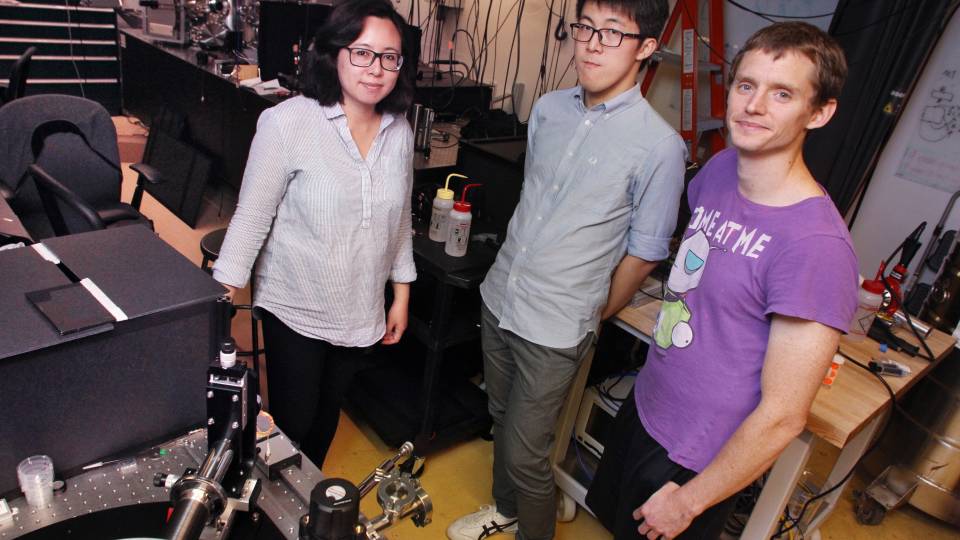Lewis Library
Three projects, each with the potential to be groundbreaking in a field of science or engineering, have been selected for funding through Princeton University's Eric and Wendy Schmidt Transformative Technology Fund.
The projects aspire to improve our understanding of social interaction, uncover new materials for quantum computers, and bring 3-D printing into widespread use for manufacturing parts and products. A faculty-led committee considered a wide range of submitted proposals and chose these projects for their innovativeness and potential to create positive societal impact.
Aimed at supporting forward-looking projects that could disrupt or revolutionize science and technology, the fund was established in 2009 by Eric and Wendy Schmidt. Eric Schmidt earned his undergraduate degree in electrical engineering from Princeton in 1976 and is the former executive chairman of Alphabet, the parent company of Google.
"We are extremely pleased and excited to announce these projects, which address significant scientific and technological challenges facing us today," said Pablo Debenedetti, dean for research, the Class of 1950 Professor in Engineering and Applied Science, and a professor of chemical and biological engineering. "Pioneering ideas carry some risk of failure due to the exploratory nature of research. We are especially grateful that, through the Schmidt family's generosity, we can support projects that may be considered too risky for traditional funding sources but that have tremendous potential to grow our understanding of the world and enhance our capabilities."

From left: Stacey Sinclair, professor of psychology and public affairs; Diana Tamir, assistant professor of psychology; Sachiko Datta, postdoctoral research associate in psychology; and Nicole Shelton, the Stuart Professor of Psychology.
A new platform for studying human social cognition
The human mind is incredibly complex, and some of the methods for studying thoughts and behaviors have limitations. Although researchers recognize that understanding the mind requires querying people of different cultures, backgrounds and experiences, most studies of human psychology rely on a relatively homogenous set of volunteers, many being college students in Western countries.
With a grant from the Schmidt fund, a team of psychology professors will seek to build a powerful online research platform, accessible through a cellphone app, to connect investigators with volunteers located around the world. Using the platform, researchers will design, build and administer studies of human behavior and cognition in many languages. Volunteers would have the opportunity to use the app to identify studies, participate by answering questions or performing tasks, and later see the results and share their involvement as part of a "citizen science" activity.
The platform will be designed to boost the diversity and number of participants in a given study, and help investigators combine data from multiple studies. The researchers hope that the ability to obtain quality data from subjects around the world may help improve the reproducibility of psychology research.
The team consists of Sachiko Datta, postdoctoral research associate in psychology, Nicole Shelton, the Stuart Professor of Psychology, and Stacey Sinclair, professor of psychology and public affairs, and Diana Tamir, assistant professor of psychology.

From left: Nathalie de Leon, assistant professor of electrical engineering; Jeffrey Thompson, assistant professor of electrical engineering; Robert Cava, the Russell Wellman Moore Professor of Chemistry; and Stephen Lyon, professor of electrical engineering.
New materials for quantum systems
Quantum systems, which operate according to the laws of quantum mechanics that govern extremely small particles, have the potential to revolutionize a variety of areas, including information processing, nanoscale sensing and communications. But progress has been slow because only a handful of materials are known to have the right quantum properties.
A team of scientists and engineers will receive a grant from the Schmidt fund to support their efforts to build a discovery pipeline to identify new materials for quantum applications. The pipeline will involve creating and testing special arrangements of atoms — for example, the removal of a single atom or the substitution of one atom with another — in crystalline materials such as diamond. These "defects" in the crystal can have special properties that make them ideal for use in quantum systems.
The goal is for the pipeline to enable high-throughput screening of various crystals, rapid creation of defects by implanting or removing atoms, and measurement of their characteristics. The project will include the design of a new piece of equipment to evaluate the optical and electronic properties of the materials. The researchers hope to create a "periodic table" of materials that would lead to new quantum information capabilities.
The team consists of Robert Cava, the Russell Wellman Moore Professor of Chemistry, Nathalie de Leon, assistant professor of electrical engineering, Stephen Lyon, professor of electrical engineering, and Jeffrey Thompson, assistant professor of electrical engineering.

From left: Mikko Haataja, professor of mechanical and aerospace engineering; Luc Deike, assistant professor of mechanical and aerospace engineering and the Princeton Environmental Institute; and Craig Arnold, professor of mechanical and aerospace engineering.
Controlling and improving additive manufacturing
The emerging field of additive manufacturing, which uses 3-D printing methods to create mechanical parts and products, has the potential to revolutionize industry. To fulfill this potential, however, researchers need to improve the control and optimization of these systems.
With Schmidt funding, a team of mechanical and aerospace engineering professors will begin to build a system that controls and monitors the additive manufacturing process, which involves using lasers to fuse starting materials such as powdered metals, ceramics and polymers. The system aims to improve control of the temperature gradients that form in the material, which are crucial for making strong final products.
To aid in this goal, the team will design and build sensors and other tools to explore the physical and chemical processes that take place during manufacturing. The resulting platform would ideally yield high-quality products that are useful in manufacturing, thus helping to fulfill the potential of this technology.
The team consists of Craig Arnold, professor of mechanical and aerospace engineering, Luc Deike, assistant professor of mechanical and aerospace engineering and the Princeton Environmental Institute, and Mikko Haataja, professor of mechanical and aerospace engineering.






